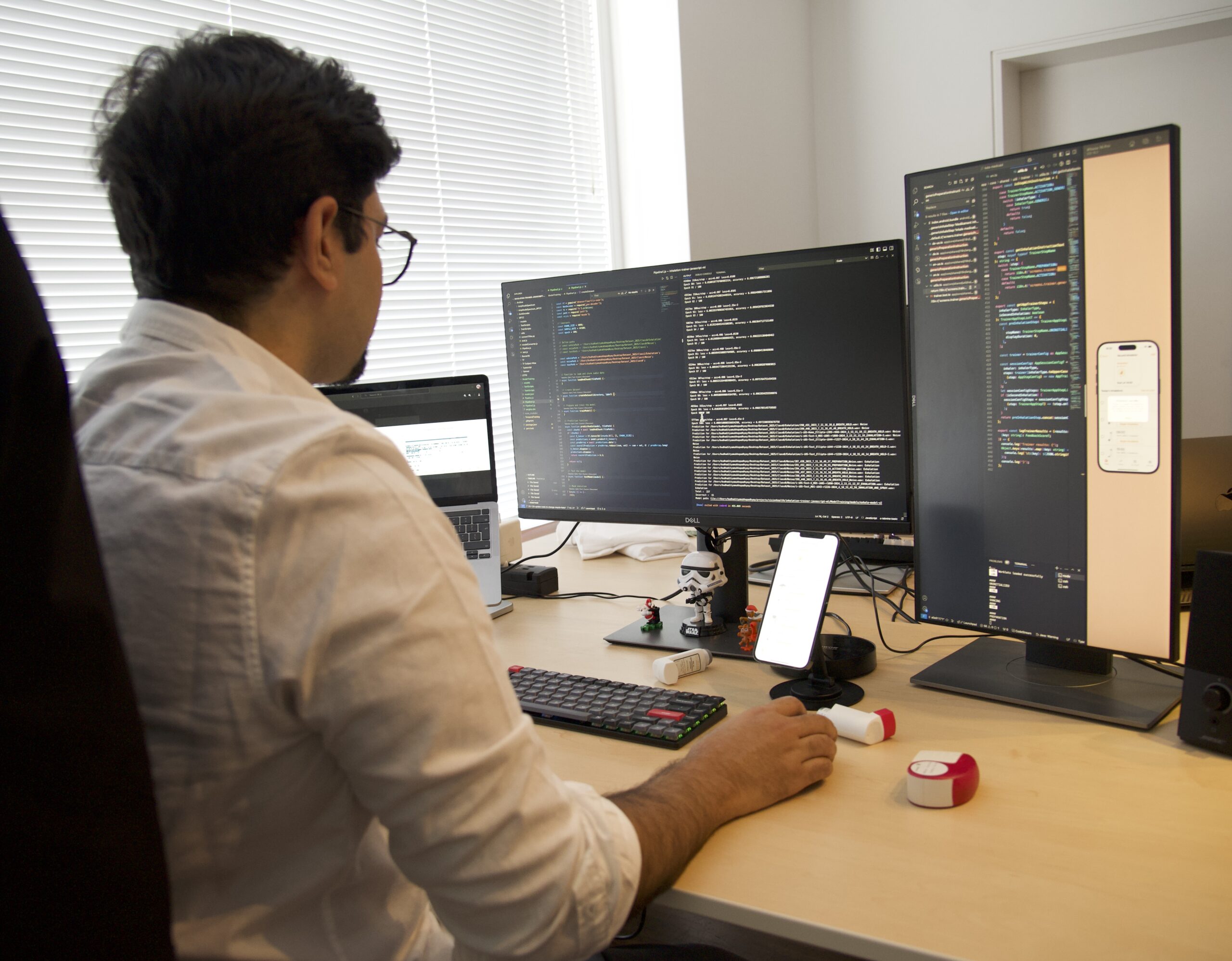
29 Apr Interview with AI Wizard Budhaditya Mukhopadhyay: Transforming Inhalation Therapy at VisionHealth
Did you know that up to 90 % of inhaler users make critical mistakes that reduce treatment effectiveness? At VisionHealth, we’re leveraging AI to change that.
Today, we sit down with Budhaditya Mukhopadhyay, an AI authority at VisionHealth, to explore how artificial intelligence is revolutionizing inhalation therapy and improving respiratory care.
1. Can you tell us about your background and your role as an AI engineer at VisionHealth?
For the past two years, I’ve been working as an AI engineer specializing in deep learning for audio processing at VisionHealth.
My focus is on developing AI models that detect inhalation, exhalation, and spray sounds to help train patients on proper inhaler usage.
By distinguishing between background noise and actual inhalation, our AI enhances therapy effectiveness. My role involves: designing and training AI models, optimizing performance under different noise conditions and ensuring seamless deployment within our mobile app Kata®.
2. What motivates and fulfills you most about your work at VisionHealth?
Helping patients use their inhalers correctly is a major motivation for me. Many people think they’re using their inhalers properly—but they aren’t, which affects their treatment.
Knowing that my work directly contributes to better health outcomes is incredibly fulfilling. Plus, working with audio-based deep learning is both complex and rewarding.
3. Why is AI essential for improving inhalation therapy?
Many patients don’t even realize they’re using their inhalers incorrectly.
AI acts like a personal inhalation coach, analyzing inhalation techniques in real time and providing immediate feedback.
With AI, we can:
- Help patients correct errors immediately
- Ensure they get the full benefit of their medication
- Improve adherence, reducing hospital visits while enhancing treatment outcomes.
AI bridges the gap between perception and reality, ensuring patients receive personal, precise, data-driven insights to improve their respiratory health.
4. What are the biggest challenges in developing AI for respiratory health?
One major challenge is distinguishing inhalation sounds from background noise, especially in real-world environments. Another is ensuring the AI model generalizes well across different patients, inhaler types, and usage conditions.
Additionally, regulatory requirements in healthcare make AI development more complex, as models need to be both highly accurate and explainable.
5. What advancements in AI are you most excited about in the field of digital health?
I’m particularly excited about the growing use of AI-powered personalized medicine. AI can tailor treatments based on individual patient data, leading to better outcomes. Additionally, advancements in on-device AI processing will allow for real-time analysis without requiring cloud computing, making digital health tools more efficient and accessible.
6. What are the next steps for VisionHealth and Kata®?
Our next steps include refining our AI models to handle even more diverse real-world conditions, expanding partnerships with healthcare providers, and integrating more personalized patient feedback features.
We’re also exploring ways to enhance regulatory compliance and scalability to bring Kata® to a wider audience.
7. What message would you like to share with patients and healthcare professionals?
-
- For patients: Proper inhalation technique can transform your treatment. AI-powered tools like Kata®are here to help—don’t hesitate to use technology to improve your health.
- For healthcare professionals: AI isn’t here to replace you – it’s a tool to support you, providing data-driven insights to enhance patient care and improve adherence.
8. Is there a person or a book that inspires you?
I’ve found great inspiration in Andrew Ng’s work in AI and machine learning. His approach to making AI accessible and practical has shaped my perspective on applying AI to real-world problems.
9. One quote you love?
“The best way to predict the future is to invent it.” – Alan Kay
10. What are the most important lessons you’ve learned in your field so far? Do you have any advice?
One of the biggest lessons I’ve learned is that data quality matters more than model complexity. A simple model trained on high-quality, well-labeled data often outperforms a complex model trained on noisy or insufficient data.
My advice?
Stay curious and be open to experimentation. AI is constantly evolving, and the best solutions often come from testing unconventional ideas.
Conclusion:
AI is transforming inhalation therapy, and VisionHealth is leading the change. Follow Budhaditya Mukhopadhyay’s journey as he revolutionizes respiratory health.
🔗 Stay updated by visiting VisionHealth’s website .
What are your thoughts on AI in respiratory health? Let us know in the comments!
KW: #AI #MedTech #InhalationTherapy #OnDeviceAI

